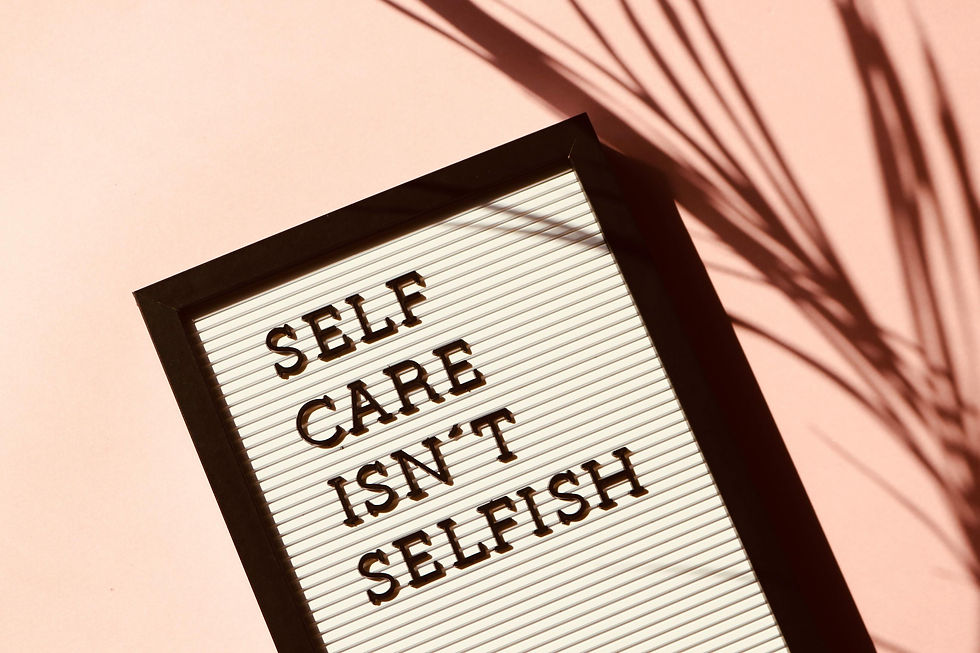Mental Health and Wellness: A Perspective at the University of New Haven
- Alexis Dawkins-Maldonado

- Mar 7, 2025
- 5 min read
As I approach the halfway mark of my college career while preparing for my third year at the University of New Haven, I’ve taken some time to reflect on my experiences. I’m midway through my journey, and it can be daunting to realize that once my time is up, all I’ll have left are the experiences and wisdom I’ve gained. I want to chronicle and share my experiences with younger students so they can learn what I learned through trial and error.
The Importance of Mental Health in College
Coming to college, I brushed off everyone who told me that university is a completely different game from high school, with more challenges than meets the eye. During my first few weeks of freshman year, I believed every upperclassman who told me “just you wait” was just trying to scare me—until I experienced firsthand what it truly meant to be away from my comfort zone, surrounded by people I didn’t know, all by myself.
I grew up poor, so my family has never been able to help me. The first thing I learned about was the pressure. I had to be locked in almost 24/7. Especially on this small campus, maintaining the image of someone who is put together is incredibly important, including in my own living space. I felt like I was constantly being judged. I had to be “on” all the time and prepared for my peace to be interrupted at any moment—by friends and newfound enemies alike.
I cannot emphasize enough how important mental health is in college. You’re away from home, surrounded by strangers. The most unexpected things will happen to keep you on your toes, and you quickly learn that classes are only a small part of your college experience.
How I Manage My Mental Health
Navigating these hurdles over the past two years has been a rough game of trial and error, with the stakes higher than ever before. I had to find my peace and my outlet while dealing with overwhelming feelings—feeling like I was the “ugly friend” and not understanding what was happening half the time. I was a 17-year-old who had graduated early, surrounded by adults.
The biggest step I took—and one I’ve never looked back on—was committing to the gym. I had been lifting since high school, but I never took it seriously. At first, I worked out because I wanted to attract women the way one of my friends seemed to do effortlessly. I wanted his confidence, physique and charm. But during my sophomore year, I found friends in the gym community, and my perspective changed. The gym became more than just a way to look good—it became a way to feel confident, release energy when I was angry, and clear my head when dealing with social or academic stress.
Now, I’m a completely different person in terms of both appearance and self-perception. I surrounded myself with people who were better than me, and in turn, they pushed me every day—to lift more, take that step, do one more rep even when I was practically in tears. The gym became something I could wake up and be excited about, all while becoming healthier and more confident in myself.
One of the most stressful parts of college for me has been juggling assignments, exams and extracurriculars (including the one you’re reading right now). I used to cope by pulling all-nighters, sleeping through entire days and missing classes just to play catch-up at night. I developed a serious caffeine addiction—to the point where I couldn’t hold a conversation unless I was sipping a Celsius or a coffee. It was dangerous. I had to change, or my heart wouldn’t keep up with my body.
By sophomore year, I discovered the Pomodoro technique, which changed the way I worked. I was diagnosed with ADHD, and the Pomodoro technique allowed me to work in short, high-intensity bursts rather than slogging through five assignments in a row. I’d work for 30 minutes, listening to music, then take a 15-minute break. This method motivated me, and I’ve ended up getting more done than ever before.
I used to think that being constantly busy was the key to success—until I had a complete nervous breakdown. I locked myself in my room and stayed in bed for days. I wouldn’t even leave to eat unless my roommate and friend forced me to. But assignments piled up, and I ended up failing my first class. Let me make this clear: Staying constantly busy will never end well for you. It never has, and it never will. Taking time to pursue things you love for your “now” instead of your “later” is crucial to long-term success. Watch a movie, go for a walk, climb into sewers with your friends (as I did). Have fun—you’re still a teenager, and it’s imperative that you build that “unc” (or aunt) lore for your future kids. While I’m not big on meditation—I fall asleep whenever I try it—I’ve found that taking a few minutes to breathe deeply and focus on the present helps me calm down when things get chaotic. When something makes you anxious or stressed—whether it’s an assignment, a toxic ex, or a looming deadline on a project you should’ve started three weeks ago—step back. Leave the room, take a walk and breathe. This will keep you from crashing or making impulsive decisions.
Building a Support System
Having a solid support system has been key for me. Over the past two years, I’ve learned that some people will actively root for your downfall and take steps to make it happen. But I’ve also found real friends—the ones I’m still close with today.
As a wise man once said, “Are you surrounding yourself with people who throw wood on your fire or those who throw piss on it?” Surround yourself with people who share your goals and genuinely enjoy your company. They are the only ones you need; anyone else is a detriment to your mental health and success. Trust your gut when it comes to the people around you—it rarely lies. Who knows? You may even find your special someone along the way.
Seeking Professional Help
I came into college thinking I had it all figured out, as if I didn’t need support or guidance (famous last words). Therapy is an important resource and never hurts to try if the need arises. While therapy depends on your insurance, the University of New Haven offers Counseling and Psychological Services (CAPS), which is accessible by appointment or walk-in.
I currently see a therapist, and he has given me a fresh perspective and valuable advice on many of the problems I face day to day. If you’re considering off-campus therapy, make sure your insurance covers it—otherwise, you could end up paying hundreds of dollars out of pocket.
Conclusion
I’m not perfect, nor will I claim to have mastered every strategy I’ve mentioned. No one has it all figured out, and no one ever will. College is a first-time experience for most, and every journey is different. It’s important to remember that the steps described by anyone—including me—don’t have to be followed to the letter.
Remember this: You’re still a kid. You have so much growing to do. Mistakes will be made, but it’s up to you whether you learn and grow from them or not.














Comments